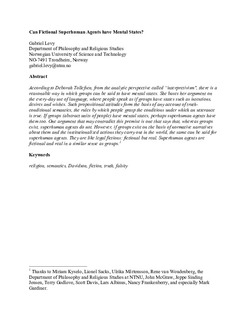| dc.contributor.author | Levy, Gabriel | |
| dc.date.accessioned | 2018-05-03T06:31:08Z | |
| dc.date.available | 2018-05-03T06:31:08Z | |
| dc.date.created | 2018-01-17T12:21:06Z | |
| dc.date.issued | 2017 | |
| dc.identifier.citation | Method & Theory in the Study of Religion. 2017, 30 (2), . | nb_NO |
| dc.identifier.issn | 0943-3058 | |
| dc.identifier.uri | http://hdl.handle.net/11250/2496868 | |
| dc.description.abstract | According to Deborah Tollefsen, from the analytic perspective called “interpretivism”, there is a reasonable way in which groups can be said to have mental states. She bases her argument on the every-day use of language, where people speak as if groups have states such as intentions, desires and wishes. Such propositional attitudes form the basis of any account of truth-conditional semantics, the rules by which people grasp the conditions under which an utterance is true. If groups (abstract units of people) have mental states, perhaps superhuman agents have them too. One argument that may contradict this premise is one that says that, whereas groups exist, superhuman agents do not. However, if groups exist on the basis of normative narratives about them and the institutionalized actions they carry out in the world, the same can be said for superhuman agents. They are like legal fictions: fictional but real. Superhuman agents are fictional and real in a similar sense as groups. | nb_NO |
| dc.language.iso | eng | nb_NO |
| dc.publisher | Brill Academic Publishers | nb_NO |
| dc.title | Can Fictional Superhuman Agents have Mental States? | nb_NO |
| dc.type | Journal article | nb_NO |
| dc.type | Peer reviewed | nb_NO |
| dc.description.version | acceptedVersion | nb_NO |
| dc.source.pagenumber | 24 | nb_NO |
| dc.source.volume | 30 | nb_NO |
| dc.source.journal | Method & Theory in the Study of Religion | nb_NO |
| dc.source.issue | 2 | nb_NO |
| dc.identifier.doi | 10.1163/15700682-12341429 | |
| dc.identifier.cristin | 1545192 | |
| dc.description.localcode | This is a post-peer-review, pre-copyedit version of an article published in [Method & Theory in the Study of Religion] Locked until 31.10.2019 due to copyright restrictions. The final authenticated version is available online at: https://doi.org/10.1163/15700682-12341429 | nb_NO |
| cristin.unitcode | 194,62,70,0 | |
| cristin.unitname | Institutt for filosofi og religionsvitenskap | |
| cristin.ispublished | true | |
| cristin.fulltext | postprint | |
| cristin.qualitycode | 2 | |
